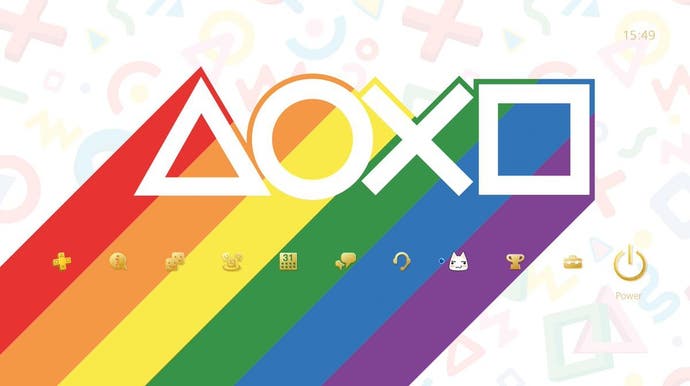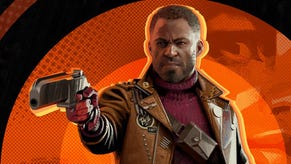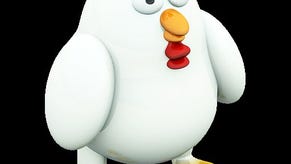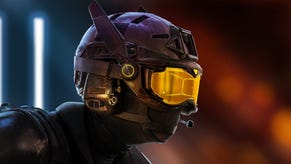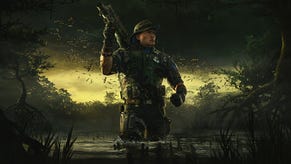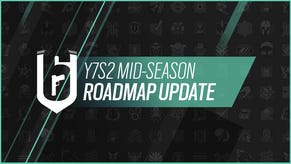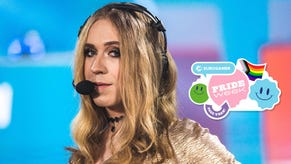Companies waved the Pride flag but gaming is still far from queer inclusive
We all need to do better.
This year's Pride month had a greater presence in gaming than any before it. Several companies adopted pride colours over their well known logos, PlayStation sponsored London Pride and The Last of Us 2's lesbian kiss took centre stage at E3, the world's biggest gaming event. The talk online seemed to be that gaming was now an inclusive space and the conservative elements holding it back had at last been vanquished.
Adopting Pride colours sends a message to the ignorant out there but did this show of support translate into any meaningful action? Not really. PlayStation sponsoring London Pride was the strongest effort made by any large video game company and while public celebrations of queerness are important, paying to essentially have PlayStation branding all over a parade doesn't exactly strike me as real support. "Corporate pride" is a real problem and it goes without saying, big companies and corporations are not your friends.
It was still more than what most companies did. No public donations to LGBT charities, shelters or activist groups. No efforts to help out queer developers, to boost their presence on platforms like Steam. Nothing.
I spoke to Hannah, a queer game developer of seven years, about their experience in the industry and despite my concerns, there's plenty to be proud of. "I think it varies a fair amount depending on the company, but the professional industry as a whole is relatively liberal and therefore I think people are either not queerphobic or sensible enough to hide it within a professional setting... People at work were actually less bothered by it than people in my musical theatre group!"
But they were able to suggest where the main issues lie.
"I think it would, however, be difficult to ignore the elephant in the room of Gamergate and its ilk," they told me. "While the workplace side is generally pretty good (in my experience!), gamers are often not quite so welcoming. You only need to spend a few minutes in most online competitive games before you're called a homophobic or racist slur. Calling it out usually gets an, 'oh, it's just a joke, I don't really mean it' response but even if that's the case for 90 per cent of the people who say that stuff, there's still a huge portion of people who genuinely think that woman, queer people, people of colour, etc. don't belong in the games industry."
At the end of this year's Pride month popular streamers Mohamad "m0E" Assad and Steven "Destiny" Bonnell II were both served 30 day suspensions on Twitch for homophobic slurs. It was a reminder of where our industry is really at. Though Twitch's response was welcome, it's still a rather weak one that seems all the milder when prominent figures within that scene, such as Duncan 'Thorin' Shields, came out to defend the use of that language. That they feel comfortable using such slurs and challenging any action taken to stamp them out is telling.
I spoke to a few queer streamers to gather the lay of the land when it comes to queer inclusion on platforms like Twitch and to my surprise, what they had to say wasn't all bad.
"Twitch as a company is extremely welcoming and supportive to the queer community," Nikki "Nikatine" Ripley says of the platform where she streams full-time. "I compare the experience to YouTube probably more than I should, but where YouTube demonotises queer creators and runs anti-gay ads in front of our videos, Twitch staff reached out to *me* to be a part of the front page pride celebration last month. I just feel like Twitch as a company does a lot sometimes to make queer people feel comfortable."
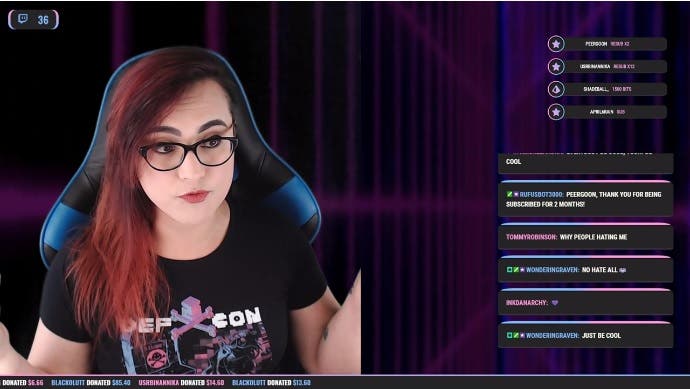
Of course, there are issues. For Taylor "SlyTQ" Quinn, the problems start with streamers themselves.
"Streamers need to be held more accountable for their chats actions, it's our job to make sure our mods are aware and working to keep chat safe and hate free. I can see [Twitch] working on improving and I look forward to seeing them take more steps to being a progressive company in the area of community management and content creator accountability.
"An implementation, though I don't know how this would work, that would be great to see would be monitoring of usernames that use numbers to bypass filters and are used to harrass LGBTQ+ and minority streamers; or remove a channel that's been banned over 10 times, possibly look into the user. As far as I know, unless they are reported, no action is taken."
Quinn is also keenly aware of a difference between the streams of those within and without the queer community. "[I] see many streamers whom, to be fair I cannot assume their sexuality or gender, that don't stream to the LGBTQ category, having a higher rate of sexist or homophobic speech within their chat. The Pepe emote has been an issue for a long time with regards to its alt-right association, however I have found many streamers who seem to not even know its history. I feel like content creators outside of the queer community in general should be researching how to be a safe space."
"Ask any girl streamer and they'll tell you they've been harassed in new and horrible ways that they never thought possible," says Ripley. "But black girl streamers or queer girl streamers somehow see even more vitriol. At this point, I've become immune to the vile things people write about me in chat, and I'm still not sure if that's a good thing at all."
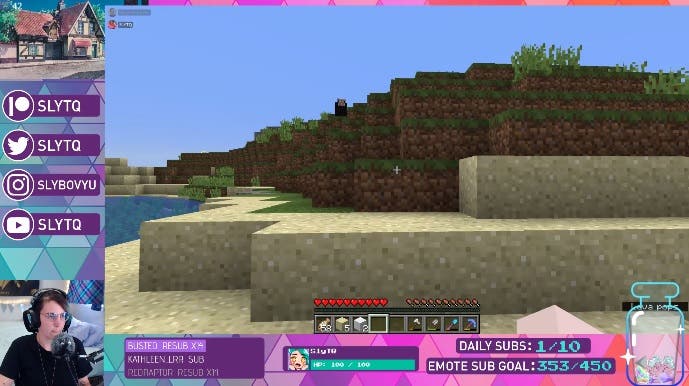
Their personal experience gaming as queer women were remarkably familiar to myself and likely to many reading this as well. "I have a highly feminine voice and when I speak in many games ranging from Rainbow Six Siege to Overwatch I get the typical comments: 'are you a girl or a young boy?' 'Shouldn't you be playing the Sims?' 'Get back in the kitchen.' 'Suck my d*ck or get out of the game', and those are the softer comments," Quinn tells me.
"Gaming while queer or a woman, especially both, is like walking in a minefield. When I'm at conventions, or exploring new games live on Twitch, a lot of comments come at me for being female more than they do for being queer. I have privilege in 'looking straight' and I've been lucky to find a community that is welcoming and beautiful; I've built from that and kept mine a place I wish everywhere could be, so I'll say this: being queer is hard, being trans is like trying to breath water. I don't have that life experience but I want to make it known that I know my trans friends and community members face much larger and brutal hurdles in gaming than I do as a cis, white, presumed straight, female."
Both have survived in online gaming spaces by finding and remaining within groups of other queer gamers, as Ripley explains. "I have more game friends now than I ever did, and although I get hate in voice chat in Overwatch, so bad I had to stop playing it, I really value the time I spend playing games with other members of the queer community. I treasure it more, knowing how positive and included I feel."
So what's the way forward then? Do they see solutions that platforms like Twitch could implement?
"An easy way to be more inclusive would be to do an LGBTQ+ streamer spotlight every month, not just during pride month," Quinn says. "Everyone seems to be on board and want to raise money when the month comes around but we need that representation all year long. Queer communities don't exist once a year, we are safe spaces for those going through similar life experiences. Pronouns on Twitch Con badges would also be great."
She wouldn't stop there either.
"I would like to see Twitch do more LGTBQ+ fundraising events outside of Pride month, and for smaller lesser known foundations. The HRC (Human rights Campaign) does good things, but they have the money to keep advertising to get more. Smaller organisations such as Lambert House (based in Seattle) need these big fundraising events. I want Twitch to reach out to the LGBTQ+ community for recommendations on hometown nonprofits and organisations that could use the help."
Of course, tackling homophobia within the games themselves would be a massive step forward. Ubisoft recently updated Tom Clancy's Rainbow Six Siege, suspending players who use hate speech and ultimately banning them if they persist in doing so - a small bit of action that has translated into a huge difference already. Players can still say what they like in voice but text chat is markedly improved. It hasn't turned Rainbow Six Siege into a welcoming space exactly, but it's stopped it being one that's actively off-putting. It's a good example of one kind of action that can make a difference and, according to a dev blog post back in April, this is the start of several ideas Ubisoft hopes to implement to deal with toxicity in its online communities. On Twitter Ubisoft stated: "We don't want slurs or hate speech being used in our game. The only players who will be punished are those who continue to use the slurs and banned words in chat."
This is what game companies and the platforms that surround the industry need to be doing. Real, practical solutions, not vapid displays of support. The good will of the queer community shouldn't be earned cheaply and that community, along with many others, deserves so much better from the biggest names in gaming. That means holding them accountable and not accepting absurd or cowardly excuses for their behaviour. While the representation of queerness in games is better and bigger than ever, it's still hardly prominent and won't matter much at all if we don't address issues in the surrounding communities. Things were better this year than last, but let's not pretend things have completely changed. The hard work to root out this toxicity has only just begun.
